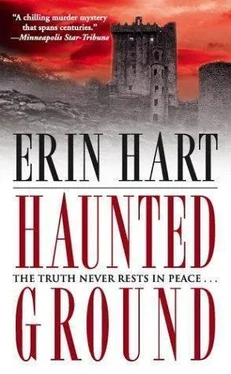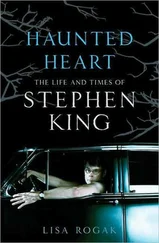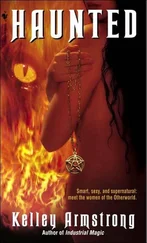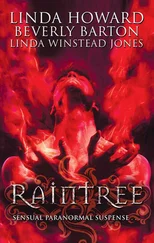“Maybe I can give you a hand,” Devaney said. Brendan’s face was expressionless; he said nothing, but turned on his heel and headed for the shed. When Devaney reached the door, he could see that Brendan had been struggling to get a new tractor tire on a rim and could probably use his help.
“Fine collection of old tools you have here,” Devaney said, kneeling to hold the wheel rim steady, and looking about him at the astonishing assortment of hay forks, scythes, thatching tools, and sleans that hung from the walls and rafters of the shed. “By Jaysus, I haven’t seen a billhook like that in years. It’s the very same as the one my father had. You still use all these?”
“I do. Lift.”
As they wrestled the tire upright and laid it down again, Devaney’s nostrils took in the smell of turf mold and damp, and yet Brendan’s tools seemed wondrously untouched by rust. Given the right provocation, Devaney imagined any one of these gleaming metal blades could cut a person’s throat as cleanly as they severed slender stalks of oats and hay. Brendan strained to pry the tire over the rim, and Devaney was close enough now to smell the sour reek of sweat that came off the man, mingled with his stale, beery breath. Strange. Everybody in town knew McGann wasn’t much of a drinker. On the rare occasions he was seen in the pub, he had a quiet pint or two on his own, and then went home. It took more than a couple to leave you stinking like a brewery the next day. As he held the tire in place, Devaney looked around the shed once more. His eyes grew accustomed to the dim light that made its way through the one tiny window, and he could see a makeshift cot in the corner, with an ancient straw mattress. His eyes returned to Brendan, registering the creases in the man’s clothing and the few bits of dirty yellow straw that clung to the back of his shirt.
“I stopped to see if you saw or heard anything out of the ordinary last night,” Devaney said.
“No,” Brendan replied. He must have seen Devaney’s chagrin at the curt answer. “I stopped for a jar at Lynch’s last night. Left around nine. I saw no one coming or going, and went straight to bed when I got home.”
“Is there anybody who might vouch for you? Your sister wouldn’t be at home by any chance?”
“No.”
“Well, that’s all right, I can talk to her later. She’s fairly involved with Osborne’s new craft workshop, isn’t she? But you’re not too keen on it yourself, I understand.” Brendan just looked at him, and Devaney’s eye was attracted to a stack of plastic bucket lids that stood on the workbench behind him. These plain, white rounds were identical to those used in making the signs that had appeared on the roadsides around Dunbeg.
“Some people say you have good reason to resent Hugh Osborne,” Devaney said. “They say—”
“It’s no secret I don’t like the bastard,” Brendan interrupted, the volume of his voice rising ever so slightly. “That’s not against the law, and the reasons for it are me own. But I was home in bed last night, Detective.” Brendan gave the iron another mighty push, and the massive tire finally snapped into place on the rim. “And you’ll never prove otherwise. I’m obliged to you for helping me here. But I’ve nothin’ more to say.”
After the cars had been towed away, Hugh Osborne proposed a trip to the excavation site.
“I’ve been so busy, I hope you don’t feel as though I’ve been ignoring your work,” he said as he drove them the short distance to the priory. “I’m really interested in how you’re getting on, that is, if you don’t mind showing me around.”
“Of course,” Cormac said. They each took a hand carrying some of the equipment, and when they reached the site, Nora began to set up for the day while Cormac gave Hugh a guided tour of the several trenches they’d dug so far.
“At the moment we’re working on an area that appears to have been some sort of midden or rubbish dump. Archaeologically speaking, middens are like treasure troves. They have so much information, not just for the purpose of dating a site, but about what people ate, what kinds of tools and vessels they had, all kinds of details about their everyday lives.” Cormac jumped down into one of the pits just barely within earshot, and Hugh crouched above him to have a look.
The day was overcast, with a strong wind pushing billowy, moisture-laden clouds eastward. Between gusts of wind, Nora heard Cormac’s murmuring voice and watched him point out for Hugh the dark layer of a charcoal deposit, and the brown stain that marked where a wooden support had been sunk into the soil. He also showed Osborne the sheets they used for describing what turned up in each test pit.
“What we’re doing here is really keyhole archaeology,” Cormac was saying. “It’s like trying to do a big three-dimensional jigsaw puzzle without any picture to go by.” Hugh was standing with his arms crossed, asking the occasional question and nodding appreciatively. Nora could see that they had become friends, and worried what would happen if it turned out that Hugh Osborne had been involved in his wife’s disappearance.
She hadn’t even told Cormac the worst part of her story last night. That her parents wouldn’t do anything to help convict Peter Hallett, despite the suspicions and the intensive police investigation, despite everything she told them about what the man had done to their own daughter. Her father simply refused to listen, and had taken an adamant position on his son-inlaw’s innocence. Nora could see that her mother had instinctive doubts, but wouldn’t allow herself to contemplate any action as long as Peter had sole custody of their only grandchild. Please try to understand, Nora, she’d said. We’ve already lost Triona. If we do anything, anything at all, he could take Elizabeth away from us as well. Forever. And then what would we have? But he had taken Elizabeth away. So what did they have now?
Nora watched the two men deep in conversation in the far trench. Cormac was right: they knew little about Hugh, and still less about the circumstances of his marriage and family life. He seemed like a decent guy on the surface. But so did a lot of disturbed people. What was that expression her gran had? She could see the old lady’s shrewd eyes, the set of her lips as she pronounced the words: street angel, house devil. The first time she heard those words was the moment Nora realized there were plenty of things grown-ups never told children. Who could say that Hugh himself hadn’t lost it and smashed up their cars? He said he’d only returned this morning, but the guy looked like hell, as if he hadn’t slept at all. It was all very well to go about their work and to keep telling themselves that they weren’t really involved here, but they were involved. Deeper and deeper, it seemed, first with the anonymous phone call, and now with all the events of last night.
Hugh took his leave, and a few minutes later, Cormac was in the trench they’d begun at the rubbish dump, about four feet down, wielding the pickaxe with a ferocity Nora hadn’t seen before.
“Cormac, did you tell Devaney about that light you saw out at the tower? I couldn’t really say anything; you’re the one who saw it.”
“No. That is, not yet. I’m not sure it’s significant.”
“He’s supposed to decide what’s significant. That’s his job.”
Cormac was silent for a moment. “I asked Hugh about the tower.”
“What?”
“Just now. I asked him about the tower. Why it’s locked up. He said he didn’t want kids climbing around in there and getting hurt.”
“Did you tell him you’d been out there?”
“No.” He stopped digging and looked up at her. “I’d like to go back. Just to have another look.”
Читать дальше











